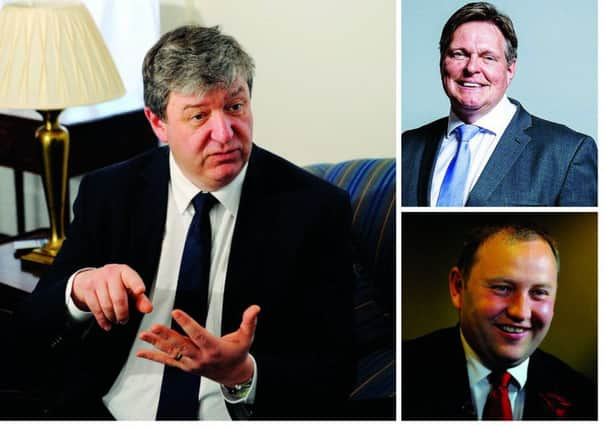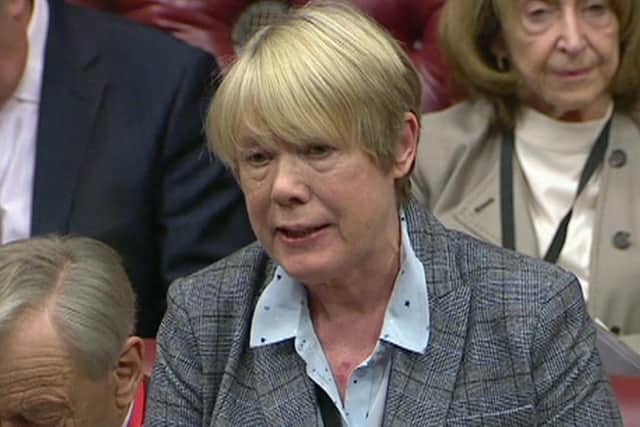Cross-party trio seek constitutional reform to keep Scotland in union


Three Westminster parliamentarians from the Conservatives, Labour and the Liberal Democrats have urged all MPs to back a shake-up of the constitution to respond to the pressures of Brexit and help keep Scotland in the Union.
Alistair Carmichael, the Lib Dem former Scottish secretary, Ian Murray, the former shadow Scottish secretary and Labour’s most senior MP in Scotland, and the Conservative member for Stirling, Stephen Kerr, today make a plea for reform “to ensure that our United Kingdom prospers in the 21st century and the divisive ideology and grievance of nationalism is not allowed to rip apart our country”.
Advertisement
Hide AdAdvertisement
Hide AdWriting in Scotland on Sunday in the week of the 20th anniversary of the first devolved elections, the group of MPs back proposals to appoint a Secretary of State for the Union, making the role one of the Great Offices of State.


The MPs warn Brexit will create a “conflict of interests” between the governments of the UK, and argue that a Department for the Union would serve as “part of the constitutional jigsaw that would solve some of the problems the country will face”. And in a direct appeal for debate around the constitution to be taken out of the hands of the UK’s nationalist parties and pushed up the political agenda, the MPs say “the English must now revolutionise their own overly-centralised system of governance”.
“These are vitally important issues which must be taken into consideration by all Unionists as we fight against nationalism and the SNP,” said Kerr. None the less the three main unionist parties have different visions of how the UK should be reformed, with varying levels of commitment to change both within and between parties.
Under Jeremy Corbyn, Labour has committed itself to a “People’s Constitutional Convention” if it gets into government. A Scottish peer and key Corbyn ally, Baroness Bryan of Partick, has been appointed to help shadow Cabinet Office minister Jon Trickett draw up plans for a constitutional convention, with federal principles and an elected House of Lords at its heart. However, Scottish MPs have grown frustrated at the lack of urgency behind Trickett’s work, and speaking to Scotland on Sunday earlier this year, Baroness Bryan admitted that progress has been too slow.
Despite there being little appetite for significant constitutional reform in the Conservative Party, Scottish Tory shadow finance secretary Murdo Fraser recently said he backed an elected upper house at Westminster representing nations and regions, in an echo of Baroness Bryan’s plan.
Meanwhile, the Lib Dems maintain their long-standing support for a federal UK, although like all proposals for constitutional reform, the issue of the status of England remains a challenge.
MPs from all parties have voiced concern at the lack of urgency on constitutional reform despite the looming prospect of Brexit.
Experts have joined the SNP government in Edinburgh and Westminster opposition parties in warning that the ongoing row over how Brexit will impact devolved government represents a “constitutional crisis”.
Advertisement
Hide AdAdvertisement
Hide AdIt is still unclear how UK and devolved ministers will make joint decisions in over a dozen crucial areas like agriculture, fishing and the environment once those powers return from Brussels after the UK leaves the EU. While control of around 80 powers in devolved areas is being returned to Holyrood after Brexit, plans for Westminster to retain responsibility in another 20 areas have been branded a “power grab” by the Scottish Government.
Conflict is also growing over the future of EU funding programmes for regional investment and agricultural subsidies, where Scotland has claimed a bigger share of the UK pot than its population. The long term future of post-Brexit agriculture subsidies remains uncertain, and consultation on the replacement for EU Structural Funds is nearly six months overdue.
At the Scottish Conservative conference in Aberdeen last weekend, environment secretary Michael Gove confirmed plans first revealed in Scotland on Sunday last year to abandon two decades of precedent and have UK government departments spend directly on projects in Scotland that have previously been the preserve of the Scottish Government.
A new Stronger Towns Fund and a proposed Shared Prosperity Fund are both expected to see local authorities in Scotland bid directly to Whitehall departments for investment money.
Responding to the plans, the president of Scottish local government body COSLA has accused UK ministers of “not playing by the rules”.
A report from the Institute for Government (IfG) think tank to mark the 20th anniversary of devolution called for urgent action to tackle the strains of Brexit on the constitution. Senior IfG fellow Akash Paun – one of the authors of Devolution at 20 – said it had “reached some similar conclusions” as the MPs.
Paun agreed a single Department of the Union could help. But he added: “The deeper problem is that Westminster and Holyrood have fundamentally different conceptions of core constitutional principles.
“Is it right that the UK Parliament can amend the terms of devolution without Scottish consent – as it did when passing the EU Withdrawal Act in 2018? And if new laws are needed to protect the UK single market, should these be agreed by consensus or can Westminster ultimately write the rules itself?”